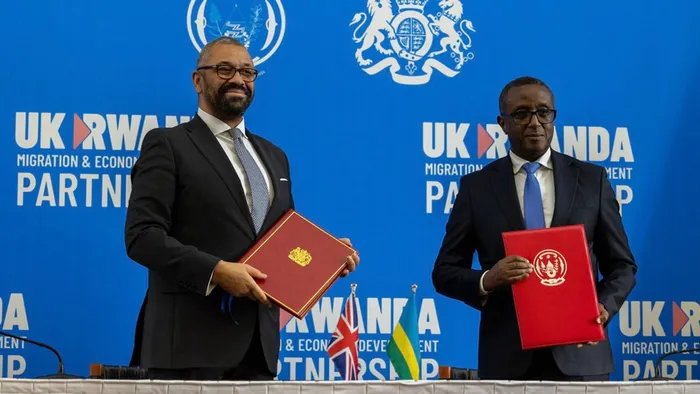Sunak’s government targets asylum seekers to improve election chances

Home Secretary James Cleverly and Rwanda Minister of Foreign Affairs and International Cooperation Vincent Biruta on December 5, 2023, after signing a new Treaty that will push forwards the UK-Rwanda Migration and Economic Development Partnership. Rishi Sunak’s government is advancing its plan to deport asylum seekers to Rwanda to boost its poll numbers, despite ongoing resistance, the writer says. – Picture: UK Government
By Ana Vračar
UK Prime Minister Rishi Sunak is intensifying its efforts to deport asylum seekers to Rwanda. This move is seen as a last, desperate attempt to strengthen the government’s position ahead of the general elections which will be held at some point in the next six months. Sunak is set on implementing the controversial plan, despite court warnings and criticisms from human rights organisations.
Jeremy Corbyn, writing for the Tribune, criticised the government’s actions, saying, “Sacrificing people’s dignity for a few votes, this latest move represents the last gasps of a dying government, determined to solidify its legacy as one that made the lives of vulnerable people even harder.”
Following a legal battle where multiple courts deemed the plan unlawful, and human right organisations questioned the safety of Rwanda as a destination country, Sunak successfully manoeuvred the Safety of Rwanda Asylum and Immigration Bill through the legislation process in late April.
Just days after the act’s passage, the Home Office authorised raids against people seeking shelter in the UK, despite the Prime Minister’s admission that the first deportation flights to Rwanda could only take off in July. The idea being that people would be detained for an extended period before they are deported to Rwanda.
“This week, many people await raids that will snatch them from their beds and put them on a plane to an unfamiliar country, or fear they may never return from a regular check-in at an immigration reporting centre,” stated Zrinka Bralo from Migrants Organise.
Efforts by local and grassroots groups have managed to block some of the raids. On May 2, activists in London successfully stopped the forced relocation of asylum seekers from a hotel to the notorious Bibby Stockholm barge. Over 40 activists were arrested, but their efforts ensured that the buses left empty.
However, the fear of being shipped off to an unfamiliar country is unbearable for many, leading to even more distress and pain. For those already held on the Bibby Stockholm barge, the stress has risen so much, people are experiencing anxiety and sleep disruption, according to local reports.
The threat of deportation has led others, living in different locations, to go into hiding or flee to Ireland. Government officials in Ireland have described the number of people arriving as unprecedented and estimated that 80-90 percent of the new arrivals are from the UK. While there is no publicly available data to back this figure, individual testimonies from both Ireland and the UK show that concerns over deportation are pushing migrants to go to ground, exposing them to even more risk and exploitation.
Both the UK and Irish governments have been criticised for their failure to uphold international protection obligations, engaging instead in a blame game over who should host the migrants. Amnesty International has condemned this behaviour as a “deeply unedifying spectacle”, urging Ireland to respect the rights of people persecuted by the UK to avoid complicity in Britain’s hypocrisy.
The full-blown effects of the Rwanda act are yet to be seen, yet it’s clear that the UK’s approach to migration has deeply affected the lives and dignity of migrants. Through a decade of shaping policies under the hostile environment framework, Tory-led governments have consistently aimed to restrict fundamental human rights, including access to housing, healthcare, and education.
This article was first published at Peoples Dispatch